The Rohingya people, one of the most persecuted communities in the world, face an ongoing struggle against genocide, statelessness, and forced displacement. Systematic efforts to erase their identity—through violence, disenfranchisement, and historical revisionism—have left them fighting not only for survival but also for the preservation of their culture. More than a million Rohingya refugees are now in overcrowded camps, where generations grow up disconnected from their homeland, risking the loss of their language, traditions, and collective memory.
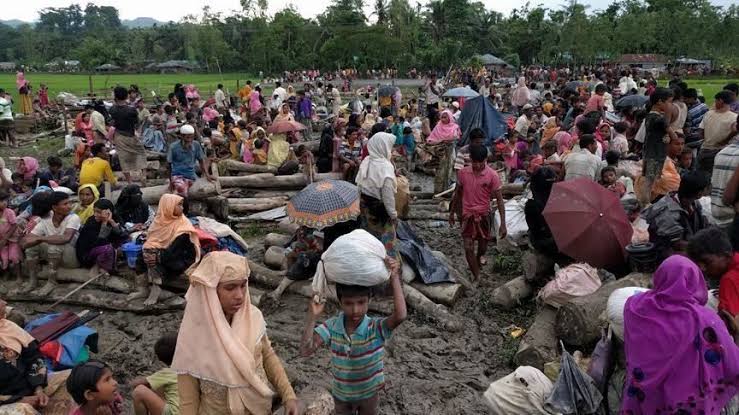
Cultural erasure is one of the most insidious dimensions of persecution. Beyond the forced displacement and statelessness imposed upon the Rohingya, there exists a deliberate effort to sever their connection to history, language, and identity. The destruction of Rohingya villages is not merely an attack on infrastructure but on memory itself. The denial of citizenship is not just legal exclusion but an attempt to render them invisible. With each policy that restricts their education, silences their language, or rewrites their past, the Rohingya are pushed further into historical obscurity. This is not just a humanitarian crisis—it is an existential one, where survival is measured not only by physical safety but by the ability to retain cultural continuity in the face of systemic erasure.
But culture does not die easily. For the Rohingya, the fight for survival is also a fight to preserve their history, traditions, and identity. In the absence of a homeland, culture becomes the battlefield, and every memory passed down, every story told, every recipe cooked becomes an act of resistance.
Documenting Rohingya Identity
In the world’s largest refugee settlement in Cox’s Bazar, Bangladesh, Rohingyatographer—an independent, Rohingya-led storytelling platform—is at the forefront of preserving and documenting the lived experiences of the Rohingya people. Through photography, writing, and art, the initiative challenges dominant narratives that seek to erase Rohingya history. Their latest project, Food for Thought, is not just a documentation of traditional cuisine—it is a profound assertion of identity and cultural survival.
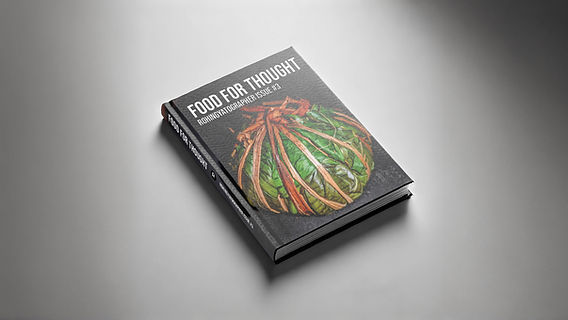
“The Rohingya people are one of the most culturally and historically rich communities in the northern Rakhine State (Arakan). They possess a deep history of unique identities and traditions. However, due to decades of oppression and the imposition of numerous restrictions on their lives, they have largely been unable to document their history, culture, and way of life.” – Ahtaram Shin, Editor of “Food for Thought”
Despite decades of displacement, the Rohingya have preserved thousands of cultural and historical aspects through oral traditions and daily practices. Among these, food holds a special place—deeply tied to identity, history, and resilience.
Food as Resistance
Food is more than sustenance for the Rohingya; it is a powerful symbol of home, identity, and resistance. It represents a deep historical connection to their homeland, the northern Rakhine State (Arakan), where their ancestors farmed rice, prepared traditional dishes, and upheld unique customs for centuries. However, displacement has forced them to adapt, often with limited resources.
Traditional dishes like hálowa (a nut-and-egg-based dessert) and luri fiçá (a rice-based bread) are still prepared, often with improvised ingredients due to shortages. These meals serve as reminders of home and continuity.
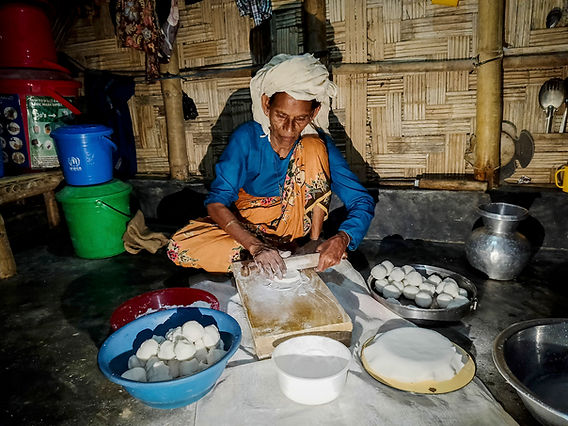
“For instance, Musa, a traditional Rohingya practice dating back to the 9th century AD, remains a significant ancestral tradition. Similarly, the practices of betel chewing and drinking tea with cow’s milk and jaggery in clay cups are deeply rooted in our history and continue to be cherished within the Rohingya community.”– Ahtaram Shin, Editor of “Food for Thought”
In refugee camps, where humanitarian aid is scarce and food rations have been slashed, the act of cooking itself has become a symbol of resilience. Monthly food allocations by the World Food Programme (WFP) dropped from $12 to $8 per person in 2023, later increasing to $10—still insufficient. In response, Rohingya refugees have turned to small-scale farming and street food vending to supplement their diets.
In response, Rohingya refugees have turned to small-scale farming and street food vending to supplement their diets. Some cultivate vegetables in makeshift gardens, while others sell snacks to earn extra income. These survival strategies highlight their resilience and determination.
Food as Cultural Memory: A Struggle Against Erasure
Displacement has put Rohingya cultural practices at risk. Young children in the camps, growing up far from their homeland, may forget their language, traditions, and way of life. Food for Thought highlights how culinary traditions serve as an anchor in the midst of upheaval.
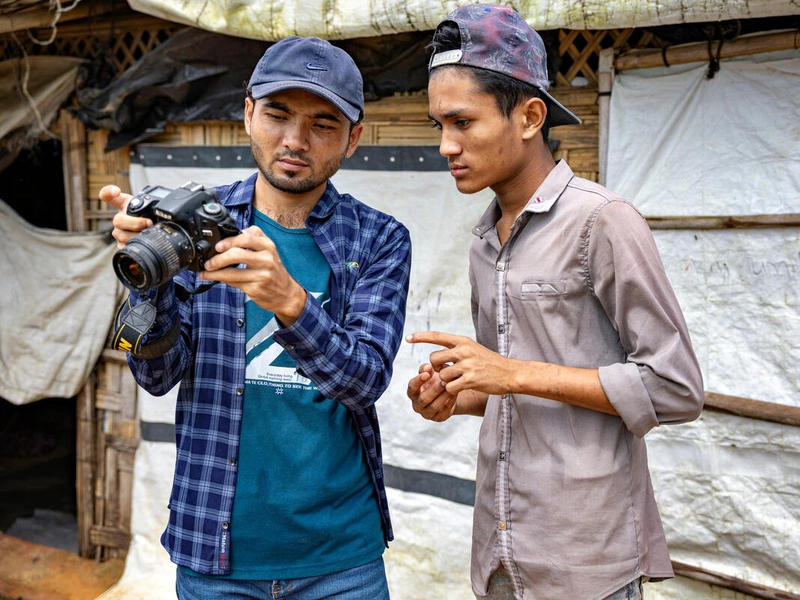
“Our culture is at risk due to displacement. Young children in the camps, growing up far from their homeland, may forget our language, traditions, and way of life. Food culture, in particular, has been deeply affected by the humanitarian crisis we face in the refugee camps of Bangladesh. By dedicating this issue to Rohingya food, we aim to preserve our cultural heritage, memories, and identity. Food is more than sustenance; it is a symbol of our culture and resilience. Through this issue, we hope to show the world that the Rohingya have a rich and vibrant culture, one that deserves recognition and respect.”–Sahat Zia, Founder of Rohingyatographer
Visual Storytelling as a Tool for Resistance
Food for Thought is more than a photography magazine. The 332-page issue, featuring 485 images taken by Rohingya refugees, is a powerful testament to cultural survival. Each photograph captures the realities of life in the camps—meals prepared over makeshift stoves, families sharing food despite scarcity, and elders passing down culinary traditions.
“Documenting our food traditions is an act of resistance against the erasure of our history and identity. It strengthens our existence, empowers our resilience, and promotes our rich heritage. By preserving these traditions, we ensure that future generations can carry forward our culture, language, and identity. They deserve to know where they come from and to take pride in their roots. They should not be marginalized or forgotten. Through this issue, we are saying to the world: we are here, we have a history, and we are proud of who we are.” – Sahat Zia, Founder of Rohingyatographer
Food plays an essential role in Rohingya social and religious traditions. During Ramadan, families and friends gather to break their fast together. They share traditional snacks like samosas, dates, and fresh fruit.
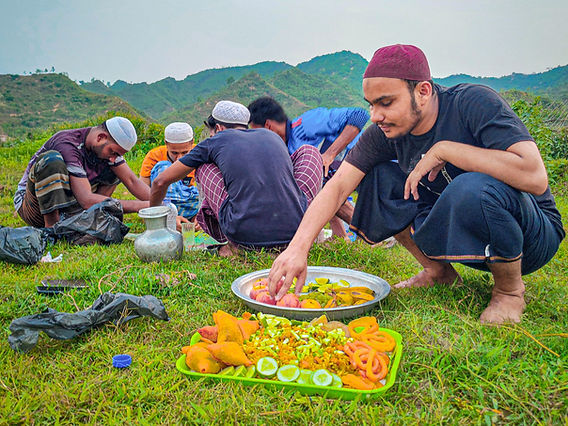
These gatherings offer comfort and remind the community of life before displacement. Young people often gather in open spaces to share Iftar meals. The magazine features photographs of these moments, highlighting the importance of togetherness.
Elders also play a key role in preserving food traditions. Many older refugees pass down recipes to younger generations. Cooking together strengthens family bonds and keeps cultural knowledge alive.
“Farming rice, threshing it using Doloin, and grilling rice to make bread (fiçá) are among the most valued practices of the Rohingya people. Hosting guests with Durus kura and celebrating feasts and ceremonies have been integral to their culture for decades. These traditions persist today, showcasing their resilience.” – Ahtaram Shin, Editor of “Food for Thought”
Reshaping the Global Narrative on the Rohingya
For too long, the global conversation about the Rohingya has focused solely on their displacement and suffering. Food for Thought seeks to shift that narrative, highlighting their resilience, creativity, and deep cultural heritage.
“This issue plays a crucial role in reshaping global narratives about the Rohingya. It moves the conversation beyond crisis and displacement to highlight our resilience, creativity, and cultural richness. Despite the limited resources and opportunities in the camps, we continue to prepare our traditional foods, preserving our heritage and passing it on to the next generation. This issue reminds the world that the Rohingya are more than a stateless and displaced community; we are a people with a history, culture, and identity that spans thousands of years. We are working not just to survive, but to thrive and reclaim our place in the world.” – Sahat Zia, Founder of Rohingyatographer
A Call to Action: Supporting Rohingya Voices
The publication of Food for Thought was made possible through crowdfunding, with 92% of its fundraising goal reached as of early 2025. Available in print and digital formats through Blurb, purchasing the magazine directly supports Rohingya photographers and storytellers.
“As editor of Food For Thought, issues 3 magazine, advocating for the rights and recognition of the Rohingya people, as well as preserving our culture, is of immense importance for us. While documentation alone cannot guarantee our rights, it can provide valuable resources that empower the Rohingya to assert our identity and claim our rights. Through these efforts, we hope to contribute to the preservation and recognition of our unique cultural heritage and identity.” -Ahtaram Shin, Editor of “Food for Thought”
By supporting initiatives like Food for Thought, the world can help ensure that Rohingya culture is not erased. Their food, traditions, and history must not be forgotten.
Looking Toward the Future
The Rohingya continue to fight for their dignity, identity, and recognition in a world that has largely abandoned them. Food for Thought is not just a collection of recipes; it is a declaration of survival. Through food, the Rohingya assert their right to exist—not just as refugees, but as a people with a culture and history worth preserving.
The question remains: will the world listen?
_________________________________________________________
Get your copy of Food for Thought: Rohingyatographer Issue #3
Available at https://www.blurb.com/b/12273873-food-for-thought
By purchasing a copy, you contribute to the next step in our journey. As we kick off 2025, we want to take a moment to thank everyone who made this publication possible. Your support has been invaluable. With 92% of our GoFundMe goal achieved, we are just a step away from making this dream a reality. Join us in closing the gap and helping share these incredible stories with the world.
Visit the website
Support the project at https://www.gofundme.com/f/rohingyatographer-magazine-3-food-for-thought
Related Stories:
82 Years of Injustice: When Will the World Recognize the Rohingya Genocide?
Escalating Violence Puts Rohingya at Risk Amid Rakhine Conflict
Religious Freedom for All: The Key to Peace & Prosperity
















